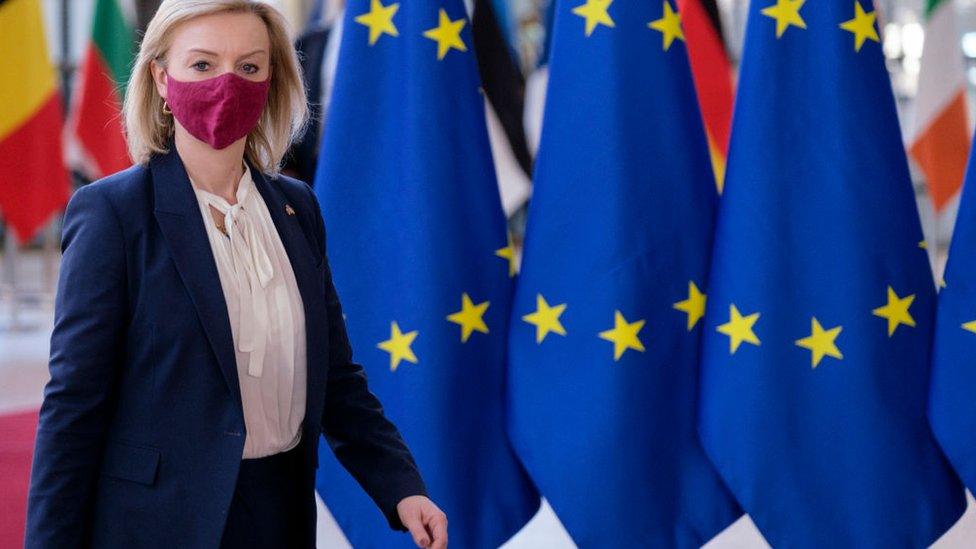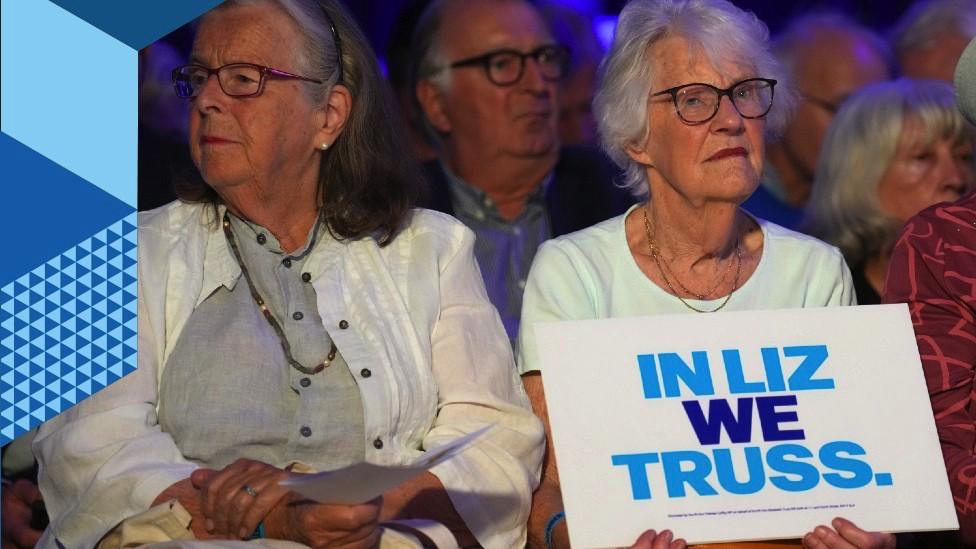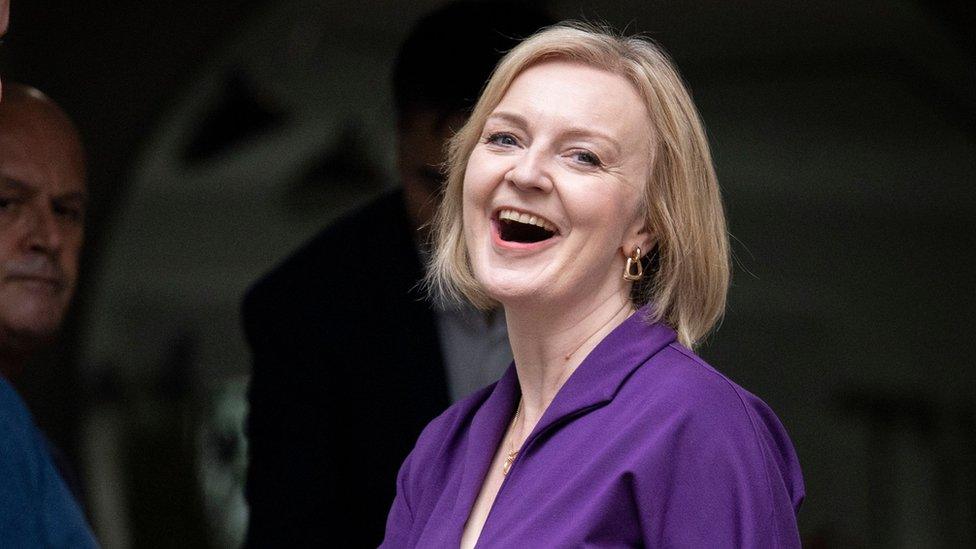Liz Truss: The urgency of relations with Europe
- Published

Liz Truss on a visit to Brussels in March
It's polite, of course, to congratulate the new leader of a neighbour and ally.
But the tone of EU leaders' messages to Liz Truss - seen here in Brussels as a hardliner on Brexit, and a hawk when it comes to Russia - reveals a lot more than a superficial "well done".
Ursula von der Leyen, the European Commission chief, tweeted that the UK and EU were partners, facing current challenges together - but that she hoped as prime minister, Liz Truss would be "constructive", respecting agreements previously reached between the two sides.
MEP Nathalie Loiseau, France's former Europe minister, was more direct, tweeting: "I hope she will refrain from making things more difficult between the EU and the UK."
Politicians in Eastern Europe, meanwhile, who openly applaud the UK for its tough stance towards the Kremlin, were unreservedly warm.
Estonia's Prime Minister Kaja Kallas tweeted a photo of her alongside Liz Truss during her time as British foreign secretary, saying: "I'm confident our partnership will only grow."

But does Liz Truss actually need to worry about what EU leaders think of her?
The answer is very much yes. EU relations are a pressing issue for the incoming prime minister. The reason: despite the political separation of Brexit, pressing events in the rest of Europe can have, and are having, a considerable real-time impact back in the UK.
When countries with a big economy like Germany, in its current hurried attempt to find alternatives to Russian energy, bids aggressively for Norwegian gas - a source the UK already relies on - that affects prices, and potentially even UK access to supplies.
The EU as a whole is now trying to find a common means of stabilising energy prices across the bloc. Analysts predict that will have quite an impact on the energy market - at least if EU countries, with their contrasting priorities, ever manage to reach an agreement.
Then there's migration.
As foreign secretary, Liz Truss promised to be "robust" with the French authorities to stop the rising number of refugees and other migrants trying to reach the UK across the English Channel. But being too assertive, or combative vis-à-vis Paris, is unlikely to guarantee that French co-operation needed from Calais.
Relations weren't helped this summer when Liz Truss retorted that the "jury was out" on French President Emmanuel Macron, after she was asked if he was a friend or a foe to the UK.
France's Europe Minister Laurence Boone recently commented that the next UK prime minister would need to be judged by their actions in office, rather than their words on the campaign trail.
But - off the record - European politicians view Ms Truss's words as a political gaffe, "ill-befitting the future leader of one of the world's most powerful nations", as a senior EU figure said to me. "Here in Europe, the jury is out on Liz Truss," he added.
Conflict over the post-Brexit agreement with the EU on Northern Ireland is another likely flashpoint for the UK's incoming prime minister, with potentially huge and immediate consequences. The issue is complex, but the impact can be summed up in three simple words.
Looming. Trade. War.
Essentially, 10 days from now, we could see the introduction of costly trade barriers, imposed by the EU on the UK.
Something Liz Truss's rival Rishi Sunak warned loudly against, because of the huge pressure the UK economy is already under.
On 15 September, all eyes in Brussels will be firmly fixed on Liz Truss.
That's the day by which the UK is legally obliged to respond to infringement proceedings launched by the EU - alleging that the UK has failed to honour its commitments under the Brexit treaty on Northern Ireland signed by Boris Johnson and the EU - known as the Northern Ireland Protocol.
If Liz Truss turns up the heat much further, the EU says it will respond first with targeted sanctions against the UK, eventually looking at suspending the entire post-Brexit trade deal, if no negotiated agreement can be found.
So, how might the UK's brand-new prime minister respond?
She could attempt to dial down the temperature with Brussels. But many EU figures I've spoken to are cynical.
Take this blunt comment from a high-level diplomat from one of the EU's most influential countries: "Ms Truss has shown she's keen to play to the political gallery at home. She cleverly utilised opposition to the Northern Ireland Protocol and to the EU itself in the Eurosceptic right of her [Conservative] party, to garner support to become leader.
"Of course, as you say in English, the proof will be in the pudding once she settles into 10 Downing Street. But we Europeans are pragmatists, not political fantasists. Brexit was politicised from the start. That's unlikely to stop with Liz Truss."
The concern in Brussels is that within days of becoming UK prime minister, Liz Truss could choose to temporarily suspend parts of the protocol by triggering Article 16 of the Treaty.
That article may be triggered if either side believes the protocol is provoking "serious economic, societal or environmental difficulties that are liable to persist" in Northern Ireland or diversion of trade.
Liz Truss and the Johnson government she served have long said there were fundamental problems with the protocol, adversely affecting politics and society in Northern Ireland. They often threatened to trigger Article 16, and this summer they provoked outrage in Brussels and very much in Dublin when they introduced a bill in the UK parliament to override most of the core parts of the protocol unilaterally.
That bill is now going to the House of Lords - where it's expected to have a bumpy reception.
Many in the EU suspect Ms Truss could be tempted to use Article 16 as a stop gap until the bill becomes law in the UK.
Given it is an international treaty agreed by both sides, Brussels says unilateral action to change the protocol is unacceptable.
Liz Truss says the UK government's proposed Northern Ireland Protocol changes are "within international law".
The EU's chief negotiator, Maroš Šefčovič, said on Friday that the EU would never walk away from the negotiating table. But he accused the UK of "not engaging in any meaningful way" with Brussels since February and of dismissing proposals and compromises the EU had offered to address issues with the protocol in Northern Ireland.
Ireland's prime minister, Taoiseach Mícheál Martin, says he'd welcome a meeting with Liz Truss early in her premiership: "I think relationships are very important and I've always in my political life worked to build relationships with people. And the Irish-British relationship is particularly important."
Liz Truss's team insists she prefers a negotiated outcome with the EU. The Northern Ireland Protocol Bill has been described by UK government figures as "an insurance policy".
EU leaders say they view it as a loaded gun on the negotiating table.
The mood in Brussels and across European capitals is not optimistic.
"Germany is far more impatient with the UK under [Chancellor Olaf] Scholz than with [Angela] Merkel," a senior EU diplomat said to me.
Berlin is also concerned about Liz Truss and her position on the crisis in Ukraine.
To date, European countries and the UK have worked well together over targeted sanctions against Moscow and sending weapons to help the Ukrainian military.
But splits have surfaced inside the EU as to how far military support should go and to what extent the aim should be to "humiliate" Russia into an unconditional surrender.
Liz Truss has been more outspoken publicly than even the Ukrainians, suggesting back in April that Russia should be driven back to its pre-2014 borders.
As I mentioned at the start of this blog, EU members Poland and the Baltic States - geographically so close to Russia and feeling threatened by Russian President Vladimir Putin - agree wholeheartedly with Liz Truss's "teach-Russia-a-lesson sentiment", as one diplomat put it to me.
But big EU powers France, Germany and Italy say they are concerned that a cornered Vladimir Putin could lash out, possibly resorting to nuclear or biological weapons.
"I hope Liz Truss will be mindful and measured," a seasoned European figure told me.
"She hopefully won't fan the flames of European allies with extremist positions."
Related topics
- Published5 September 2022

- Published6 September 2022

- Published20 October 2022

